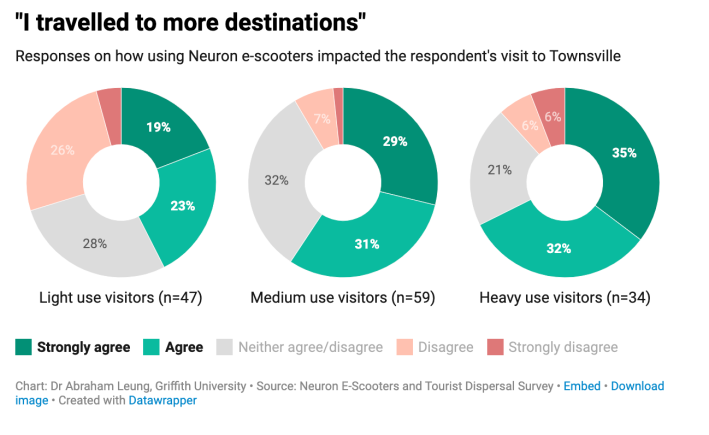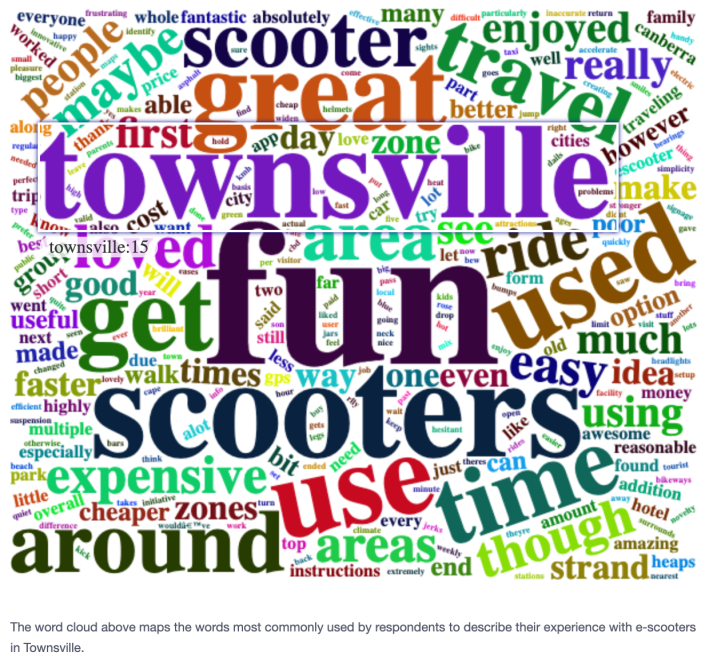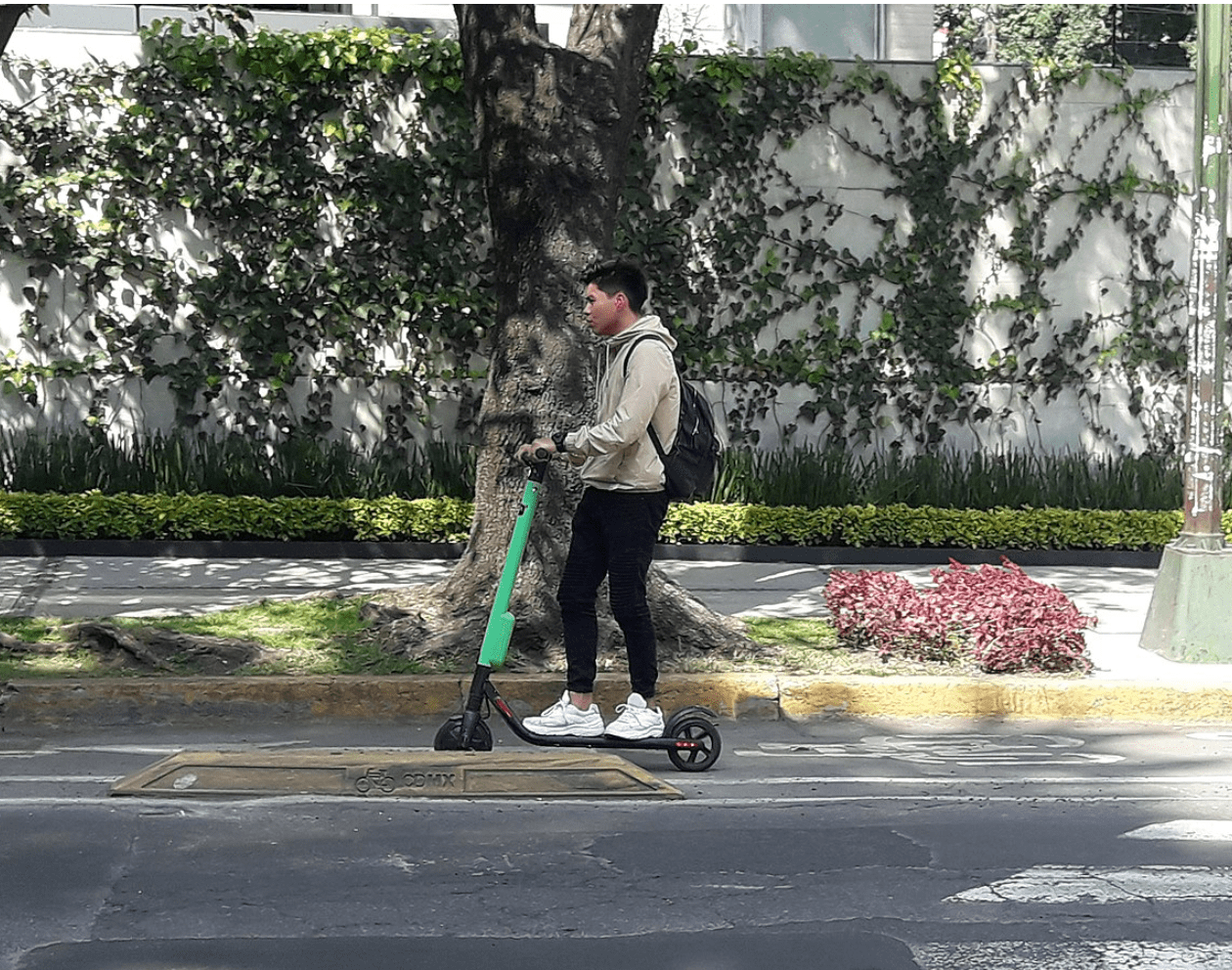Shared e-scooters are becoming common in major cities around the world. Initial safety concerns about e-scooters left some councils wary, but early results from a research survey shows major benefits from e-scooters for tourists and local economies.
We already knew visitors and local residents use bike-sharing schemes differently. The effects for tourist attractions and visitors – an increase in visits and better experience – are complementary. But that’s bikes.
Until now there has been limited evidence that e-scooters help tourists either visit more local attractions or spend more. Australia’s first e-scooter trials began in Brisbane as recently as 2018. Services have since been launched in South Australia, the ACT, North Queensland and the NT.
While e-scooters may offer a low-carbon option for post-COVID tourism, do these schemes benefit tourist cities?
Avid e-scooter tourists spend more
Our research team at Griffith University’s Cities Research Institute partnered with Neuron Mobility to conduct a survey of Townsville tourists between December 2020 and February 2021. The survey collected shopping and travel patterns of 140 visiting e-scooter users, as well as the patterns of 80 Townsville residents (see the interactive map below). Some of these users had bought multi-day subscription passes.
We analyzed the visiting e-scooter users’ travel and spending behaviors. Though their e-scooter hire costs were identical, the visitors who rode the e-scooters the most spent more money in Townsville each day. The more avid e-scooter users (the top third by distance travelled) spent 41% more per day than those in the bottom third for use.
The avid users completed on median 11 e-scooter trips, covering nearly 26km (16 miles) each, while in Townsville. The map above shows how these visitors dispersed, experiencing more local destinations in the city.
Many of these trips (60%) would have been completed by walking if e-scooters were unavailable. They would have taken longer to complete each trip on foot, thus limiting the total number of destinations visited. Other trips wouldn’t have occurred at all. One user commented:
“We enjoyed being able to travel to areas that we would not normally have seen or were too far to walk in a reasonable amount of time.”

Across all the e-scooter users surveyed, most (69%) had never ridden an e-scooter before, but 91% reported they were easy to use. Confirming the positive impact of e-scooters on both city image and visitor experience, 93% said they enjoyed traveling within Townsville.
“It was amazing to see so many people enjoying scootering along the Strand and the mix of pedestrians and scooters worked well.”
![Screen Shot 2021-06-29 at 11.18.54 AM]()
Boomers on scooters – and it’s mostly women
A major misconception is that e-scooter riders tend to be younger and mostly men. Our survey found instead that 46% of the visitors who used the e-scooters were over the age of 40, many of them much older than that. The majority (55%) were female.
Of the visitors, avid users spent more money at restaurants and cafes, dining in. Light users spent a greater proportion on shopping and services.

When asked, visitors tended to be very positive about the e-scooter experience:
“Particularly liked the weekly pass which was extremely cost-effective. Would highly recommend and will use again.”
“A great option for a first-time visitor to Townsville to quickly see the sights and get my bearings of local attraction(s).”
Of the few negative issues raised, some visitors wanted the service area in which the e-scooters could operate expanded. Others would like some signage at preferred scooter parking locations to make drop-offs easier.

To sum up, our research finds:
- e-scooter sharing schemes are a convenient and enjoyable way for tourists to explore a city
- many users are traveling 26km (16 miles) or more on e-scooters while in town
- e-scooters assist tourist dispersal
- e-scooter use encourages tourist spending.
More questions to be answered
Our methods have been applied in Townsville only. We have also not yet compared tourist outcomes across different forms of mobility. But, on the face of it, there is now a case that tourist cities that adopt e-scooter sharing are boosting their image and tourism economy.
There are many things that we still don’t know about e-scooters and tourism. What is the scale of these benefits? How might cities calculate them when assessing mobility proposals?
When tourists disperse more widely, are they spending more in local “mum and dad” businesses and less in multinationals? What are the best pricing packages and bundles for tourists? And how can these technologies be further improved, and integrated with other modes of transport, to provide seamless, integrated mobility for urban tourists?
We will try to answer these questions in future. But for now, at least, it looks like e-scootering has been a major win for Townsville.

Matthew Burke is an associate professor in the Cities Research Institute at Griffith University
Elaine Chiao Ling Yang is a lecturer in tourism at Griffith University
Abraham Leung is aPostdoctoral Research Fellow in the Cities Research Institute at Griffith University.
Benjamin Kaufman is a PhD Candidate at the Cities Research Institute at Griffith University.
This originally appeared on the Conversation and is republished with permission.







